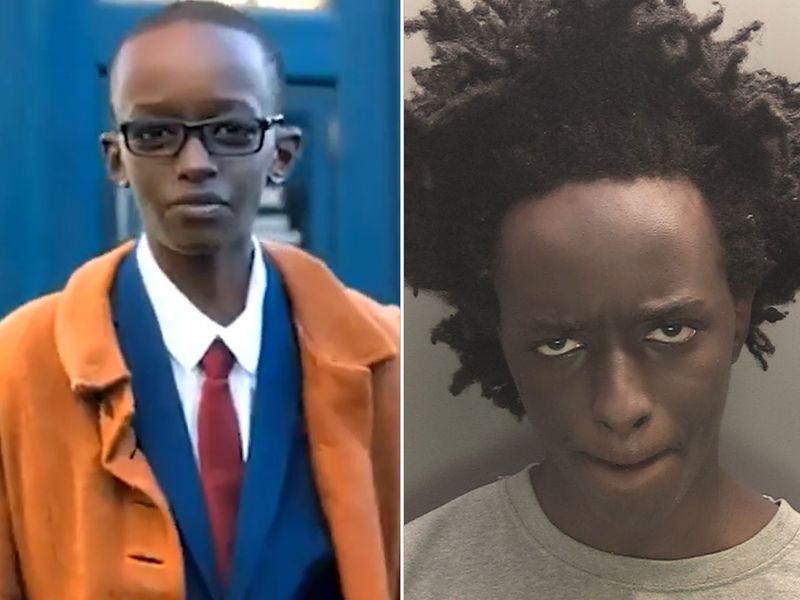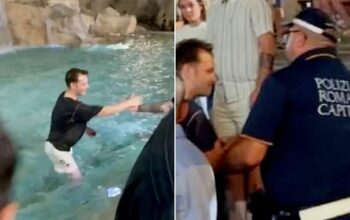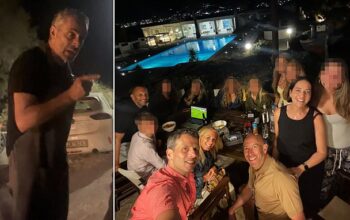Nearly a year after an unspeakable tragedy shook the town of Southport, a public inquiry has officially begun, aiming to uncover how such a horrific event was allowed to unfold.
It wasn’t just the loss of three innocent lives—Alice, Bebe, and Elsie—that stunned the nation, but the chilling realization that warning signs had been missed time and again.
Sir Adrian Fulford, who is leading the inquiry, opened the hearings by calling the attack “one of the most egregious crimes in UK history.”
He made it clear that this investigation isn’t just about looking back—but about demanding change.
A Calculated Attack at a Children’s Dance Club
The attack took place on July 29 last year at a Taylor Swift-themed dance party—an event meant to bring joy.
Instead, it became a scene of unimaginable horror.
Axel Rudakubana, 17 at the time, carried out a brutal and deliberate rampage, killing three girls—nine-year-old Alice da Silva Aguiar, six-year-old Bebe King, and seven-year-old Elsie Dot Stancombe.
In addition to the fatalities, eight other children, a dance instructor, and a local businessman were severely injured.
Even more were left emotionally scarred, including 16 children who managed to escape but will carry the trauma for life.
A Sentence Meant to Match the Crime
Earlier this year, Rudakubana pleaded guilty to multiple counts of murder and attempted murder, receiving a life sentence with a minimum term of 52 years—a sentence rarely handed down to someone so young.
Sir Adrian, a former vice-president of the Court of Appeal, was chosen by Home Secretary Yvette Cooper to lead a comprehensive and “forensic” inquiry into the events.
His mission is to provide real answers to the families and to ensure changes are made to prevent anything like this from happening again.
How Did No One See This Coming?
A key focus of the inquiry is how Rudakubana managed to fall through the cracks of so many agencies—police, courts, social services, and the NHS—despite leaving behind an alarming trail of red flags.
It turns out he was known to several authorities, and even referred to Prevent (the UK’s counter-terrorism program) three separate times.
Between 2019 and 2021, there were numerous reports and calls concerning his dangerous behavior. Yet somehow, nothing was done that might have stopped him.
Disturbing Evidence and Missed Opportunities
The inquiry will also consider disturbing and undisputed facts already on the table.
Rudakubana had been expelled from school for violent behavior—including an attack with a hockey stick—and was once caught with a knife, openly stating his desire to kill another student.
He had repeatedly researched school shootings and extremist violence online.
On his devices, authorities later found bomb-making instructions and terror-related manuals, including the infamous “Al-Qaeda Training Manual.”
And still, the response from the system was inadequate.
He even managed to order a large knife online, and days before the attack, attempted to enter his old school armed with a weapon.
He had already built a private arsenal: machetes, arrows, knives, a sledgehammer, even materials to make Molotov cocktails and ricin poison.
A Disaster That Was Far from Unpredictable
Sir Adrian was direct in saying that this attack should never be viewed as a “sudden catastrophe.”
By July last year, Rudakubana was a known and credible threat. His descent into violence was neither sudden nor secret.
The chairman condemned the overall failure to monitor him adequately, calling it a “general failure to intervene.”
He noted that Rudakubana had unrestricted access to violent materials online and was able to act freely with dangerous intent, without ever being stopped.
A Moment of Silence and a Pledge for Change
During the hearing at Liverpool Town Hall, the names of the three murdered girls were read out. Attendees stood for a minute of silence in their memory.
While Rudakubana’s name will not be spoken during the inquiry—for the benefit of the victims and their families—his actions and the institutional failures around him will be thoroughly examined.
The inquiry is drawing on documents and testimony from 15 different organizations, including MI5, NHS England, and Merseyside Police.
And no stone, Sir Adrian promised, will be left unturned.
A Broken System That Needs Fixing
The inquiry will now examine the effectiveness—or lack thereof—of how authorities shared information and handled threats.
From the Prevent programme to police responses, the hearings aim to pinpoint where things went wrong and what must be urgently changed.
Sir Adrian made it clear: “We are not helpless when faced with individuals on a path to extreme violence.”
He called for immediate and practical changes to protect society, especially the most vulnerable.
The Prime Minister and Public Demand Accountability
Prime Minister Keir Starmer previously stated that Southport “must be a line in the sand,” and insisted that “nothing would be off the table” in the inquiry’s scope.
Sir Adrian echoed that resolve, emphasizing this would not be a whitewash.
Instead, he promised a process that would drive real reform.
Rachael Wong, a lawyer representing the families of the three girls, added that while no investigation can undo their loss, the least that can be done is to ensure something like this never happens again.
“Only through intense public scrutiny,” she said, “can real change be made.”
Looking Ahead: The Next Phase
The inquiry’s next phase will move beyond Rudakubana to explore a broader issue—the rising trend of children being drawn into extreme violence.
The hearings aim to understand how such young individuals are becoming radicalized or desensitized to harm, and what can be done to reverse the pattern.
It’s worth noting that the civil unrest and rioting that followed the murders will not be included in this inquiry.
The focus remains on prevention, accountability, and creating a system that can act before tragedy strikes.
What’s Next?
As the inquiry continues throughout the year, the hope is that it won’t just be about naming failures—but about rewriting the future.
Families want justice, yes—but more than that, they want to know their children’s deaths won’t be in vain.
Sir Adrian’s words ring heavy with responsibility: “We must understand what went wrong—and then take every step possible to make sure it never happens again.”
The clock is ticking, and the country is watching.



